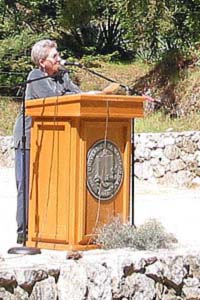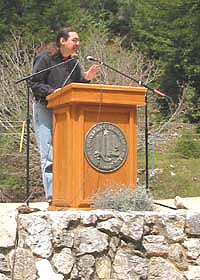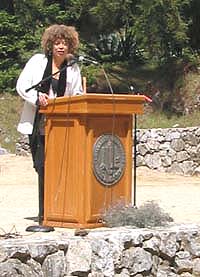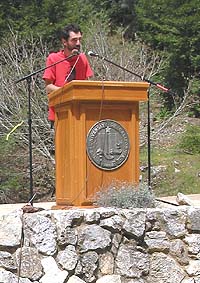|

 

|
April 7, 2003
Hundreds gather for teach-in about the war
By Jennifer McNulty
The war in Iraq was denounced as immoral, illegal, and unjust during
a student-organized teach-in that drew a crowd of at least 500 to the
Upper Quarry on April 3.
|
Among those speaking at the teach-in were (top to bottom):
faculty members Bettina Aptheker, Paul Ortiz, and Angela Davis;
and graduate student Sean Burns, one of the organizers. Photos
by Mary Ann Dewey
|
|

|
|

|
|

|
 |
| A campus web
page contains more information about war-related events and
campus support services. |
Faculty and students took turns at the podium during the quarry event,
which was followed by focused panel discussions on topics such as racism
and the war, women and the war, media and the war on terror, religious
perspectives on the conflict, and the U.S. military and universities.
The teach-in was organized by Standing
United for Peace! (SUP).
"This war in Iraq is an obscenity," Bettina Aptheker,
professor and chair of women's studies at UCSC, told the crowd. "We
are being lied to systematically by the media, the government, the press,
and the president."
"We should make no mistake between the kinds of diplomacy Hitler's
regime engaged in during the 1930s and the kinds of diplomacy the Bush
administration has engaged in. There are direct parallels, and it's
very frightening," said Aptheker, a lifelong activist who recalled
participating in her first teach-in as a UC Berkeley student during
the Vietnam War.
Like many speakers, Aptheker congratulated the crowd for gathering,
and she spoke hopefully of the growing peace movement. "Our agenda
should be to overthrow Bush," she said. "We have an election
coming in 2004, and there's no excuse for anybody to be too cynical
to register and go out and vote. . . . It matters who is in the presidency.
There's a difference, and that difference matters to the future of the
world."
Among the speakers were two veterans of the U.S. military. Paul Ortiz,
assistant professor of community studies and a veteran of U.S. military
action in Panama, decried the lack of choices for people of color, who
are overrepresented in the armed forces and in prison.
"The Marines have the highest representation of Latinos in the
armed forces with 14 percent, and Marine Corps recruiters deliberately
play up the macho image," said Ortiz, who denounced the practice
as racist and applauded the efforts of UCSC students who work on gang
prevention and alternatives to youth violence.
Noting the case against affirmative action in admissions at the University
of Michigan that was heard before the U.S. Supreme Court earlier in
the week, several speakers decried the lack of opportunities for people
of color.
"It seems the military is now the major alternative to imprisonment
for people of color in our communities," said history of consciousness
professor Angela Davis.
NeEddra James, a graduate student in history of consciousness and a
member of the Women of Color Research Cluster, criticized the Bush administration's
pursuit of Saddam Hussein and called for a shift in government priorities
that would support education, health care, and social services.
"Freedom doesn't follow from mass killings, environmental devastation,
and public humiliation," said James.
Alan Richards, a professor of environmental studies who specializes
in the political economy of the Middle East, described the killing and
maiming of people--civilians and soldiers on both sides--as the "first
and most important consequence" of the war.
But the war with Iraq will have "very serious political consequences,"
stemming from Bush's aggressive pursuit of "essentially unilateral"
action, said Richards, who called the putative coalition that backs
the United States a "coalition of the bribed and berated."
The war has "gravely weakened the governing structure of the international
world," he said.
"Many of us think the political war has already been lost,"
said Richards, noting that the war has enraged the largest generation
of Arabs and Muslims in history. Richards quoted Egyptian president
Hosni Mubarak who said, "You are creating 100 Osama bin Ladens
by doing this."
The Bush administration aspires to "transfer its military superiority
to political and economic dominance not only of Iraq but of the entire
Middle East," said Davis, who called on members of the audience
to recall the "major crisis of democracy we experienced" with
the outcome of the 2000 presidential election.
Davis and others critiqued mainstream media coverage of the war, which
she said is being proscribed and manipulated "so we'll be able
to imagine this war as one extended video game." She called on
the media to cover "radical critiques of the United States"
that are emerging in Europe and the powerful antiwar movement building
in Germany. The antiwar movement "is the only way to arrest the
U.S. drive toward empire," said Davis.
Students have a major role to play in the peace movement, according
to Maia Ramnath, a UCSC graduate student in history and a member of
SUP. Students who have been active for years in the struggle for economic
justice are poised to shift their focus to the fight against "militaristic
imperialism" and those who want to "claim access to the world's
resources with our dollars and guns," she said.
"The United States' 'shock and awe' has been countered by global
rage and fury as millions of people have gone into the streets to express
their outrage at Bush's mass slaughter of innocent lives," said
Martin Smith, a UCSC student and former U.S. Marine.
Smith attacked the hypocrisy of the Bush administration, which has called
on Americans to support U.S. troops in Iraq even as it asked Congress
in March for a $14.6 billion cut in veterans benefits that would reduce
rehabilitation services, health care, and even burial benefits for vets.
Twenty-five percent of Gulf War vets are disabled, and 10,000 have died
since the end of that war, many of cancer, according to Smith. Psychological
trauma, including posttraumatic stress disorder, is rampant among combat
veterans, said Smith, noting that more Vietnam veterans have committed
suicide since the end of that war than were killed during combat.
The most supportive thing Americans can do for U.S. troops is encourage
them to "follow their conscience and do the right thing" before
blindly following orders from their commanding officers, said Smith,
who is active in a veteran-sponsored effort to reach members of the
military.
The noon-hour teach-in ended with hopeful words from Aptheker, who echoed
the optimism expressed by several speakers.
"There has never been such a worldwide movement for peace,"
said Aptheker. "May it flower, may it blossom, may it prevail."
Return to Front Page
|
|